Add this eBook to your basket to receive access to all 4,200 records. Our indexes include entries for the spelling davis. In the period you have requested, we have the following 4,200 records (displaying 3,561 to 3,570): These sample scans are from the original record. You will get scans of the full pages or articles where the surname you searched for has been found. Your web browser may prevent the sample windows from opening; in this case please change your browser settings to allow pop-up windows from this site.  Outstanding soldiers of the South Staffordshire Regiment
(1881-1901) Outstanding soldiers of the South Staffordshire Regiment
(1881-1901)
Each year the best soldiers of the regiment were chosen for long service and good conduct medals. This register gives rank, name, regimental number, and date of recommendation. (The sample scan is from the East Surrey regiment). The register is essentially a register of recommendations, annotated with details of the issue of the medals. Where no gratuity accompanied the medal, the entry is marked 'W. G.' (without gratuity); where, for one reason or another, the medal was not issued, the entry is marked 'N. S.' (not sanctioned) and struck through. The regiment was based on the 38th Regimental District - Lichfield. The 1st battalion embarked from Ireland for Malta in 1880, and was moved in 1882 to Egypt, where it gained the honour "Egypt, 1882". Having been withdrawn to Malta in 1883, the troops were brought back into Egypt and the Soudan, adding "Nile, 1884-5" and "Kirbekan"). They were taken back to Gibraltar in 1886, but returned to Egypt in 1891. In 1893 the battalion returned home; in 1898 it was moved to Ireland; in 1899 to Gibraltar; and in 1900 to take part in the South African war, taking part in the relief of Wepener, and the fighting at Wittebergen and in the Orange River Colony, and adding "South Africa, 1900-1902" to the colours. The 2nd battalion returned from Singapore in 1880, and in 1885 was stationed at Manchester; it embarked for Egypt 18 February 1893. | Sample scan, click to enlarge
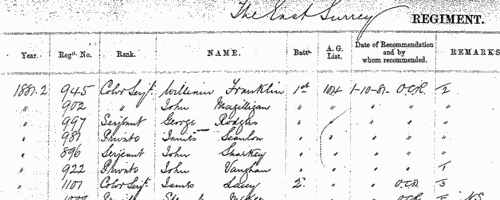
| Boys entering Uppingham School
(1901)
The public school at Uppingham in Rutland was founded by Archdeacon Johnson in 1584. A roll of scholars from 1824 to 1905 was edited by J. P. Graham, and published in 1906. This was a revision and updating of an 1894 edition of the roll, the great bulk of the work having been done by Mrs Mullins. The roll is arranged by year, and within each year by term of entrance, and then alphabetically by surname within each term. Each boy's name is given, surname first, with an asterisk where known (in 1906) to have died. Then there is month and year of birth, father's name (most often just surname and initials) and address (at entrance). Where the boy represented the school at Rugby football (XV) or cricket (XI), that is indicated. After the month and year of leaving the school, there is a brief summary of achievements in later life, and, where known, address as in 1906; but as late as this year, most boys were still at school and the entries are brief. From 1875 onwards the house within the school is also noted, with these abbreviations: A., Mr Constable's House; B., Brooklands; C., West Bank; E., Mr J. Gale Thring's House; F., Fircroft; Fgh., Farleigh; H., Highfield; L., The Lodge; L. H., Lorne House; M., Meadhurst; N., The Hall; R., Redgate; R. H., Red House; S., School House; and W. D., West Deyne. | Sample scan, click to enlarge
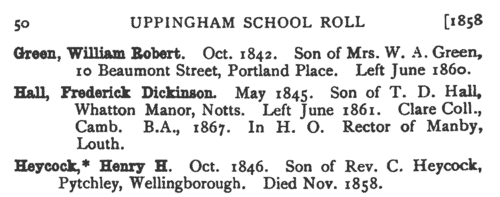
| Naturalizations
(1901)
The Home Office issued monthly lists of aliens to whom Certificates of Naturalization or Readmission to British Nationality had been granted by the Secretary of State under the provisions of 33 Vic. cap. 14 and been registered in the Home Office pursuant to the act during each previous month. These notices, from January to December 1901, refer to naturalizations from December 1900 to November 1901. | Sample scan, click to enlarge
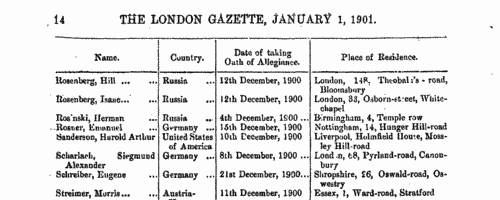
| Unclaimed Naval Prize Money
(1855-1902)
Various prize moneys were awarded to officers and men who served on board her Majesty's ships. For one reason or another a substantial number of these prizes, from as little as a shilling or two to as much as many pounds, remained undistributed by 1902, when this comprehensive list of the unclaimed moneys was printed: it lists unclaimed shares of prize money, slave and pirate bounties, salvage awards, parliamentary grants, gratuities and other moneys distributed by the Admiralty 1855 to 1902, but which omits moneys for service on the China Station during the war of 1856 to 1880, and special gratuities for service in Egypt (1882), Soudan (1884) and Soudan and Nile Expedition (1884-1885), for which there are separate indexes. In each case the sailor's name is given first (surname, then christian name or initials); rank or rating; ship in which serving at time of capture or award; and the amount due. | Sample scan, click to enlarge

|  London Metropolitan Police
(1892-1902) London Metropolitan Police
(1892-1902)
The London Metropolitan Police Register of Joiners (MEPO 4/336) lists policemen joining the force 1 January 1892 to 23 June 1902 (warrant numbers 77319 to 88811). The register is alphabetical, in so far as the recruits are listed chronologically grouped under first letter of surname. It gives Date of Appointment, Name, Number of Warrant, Cause of Removal from Force (resigned, dismissed, promoted or died), and Date of Removal. A final column of 'Remarks' is largely blank, but occasionally gives an alias or a cross-reference to another warrant number. | Sample scan, click to enlarge

|  British artillerymen fighting in South Africa
(1899-1902) British artillerymen fighting in South Africa
(1899-1902)
The Queen Victoria's South Africa Medal was awarded (after her death, in the event) to all who had served honourably in the various campaigns in the Boer War. Returns were made from each unit, and consolidated into nominal roll, of which this is the one for the Royal Artillery. Confusingly, the ledgers used had originally been printed for a register of men transferred (or re-transferred after mobilization) to 1st Class Army Reserve. All the original column headings were therefore struck through, and the roll was prepared with this information: Date of Issue; Regimental Number; Rank; Name; Unit; Medal (a 1 indicating that a medal was awarded); [number of] Clasps; the reference to the source in the original returns, usually starting with AG for papers in the hands of the Adjutant-General, and 68/Art/ for the Royal Artillery records. The final column, normally left blank, was occasionally used for explanatory remarks. | Sample scan, click to enlarge
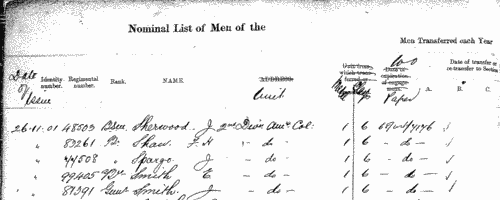
| Naturalizations
(1902)
The Home Office issued monthly lists of aliens to whom Certificates of Naturalization or Readmission to British Nationality had been granted by the Secretary of State under the provisions of 33 Vic. cap. 14 and been registered in the Home Office pursuant to the act during each previous month. These notices, from January to December 1902, refer to naturalizations from December 1901 to November 1902. | Sample scan, click to enlarge

| Arrivals in Shanghai (1903)
The Missionary Journal in the Chinese Recorder lists births, marriages, deaths, arrivals and departures relating to Christian missionaries in China.
| Sample scan, click to enlarge

| Boys entering Clifton College
(1903)
Clifton College near Bristol was established in 1862. This edition of the Clifton College Annals and Register for the Old Cliftonian Society by F. Borwick was published in 1925. Boys are listed alphabetically by term of entry, with full names, surname first, in bold. Father's (or widowed mother's) name is given (surname and initials) in capitals, and address. Then there is the name of the house (N. T., North Town; S. H., School House; S. T., South Town), first and last forms, distinctions in school work and games, and month of leaving. Where known, the editor then gave a career summary with month of death; or, if still living, address as in 1925 (in italics). | Sample scan, click to enlarge
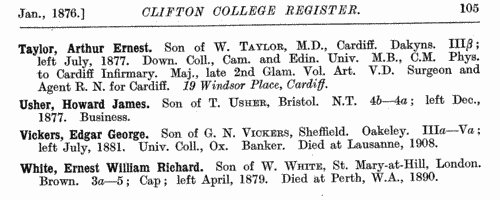
| Boys entering Harrow School
(1903)
This Second Volume of the Second Series of the Harrow School Register was edited by J. H. Stogdon and published in 1925. The boys are listed by term of entrance, and then alphabetically by surname and christian names (in bold). Next, in brackets and in italics, is the school house to which he belonged - or, H. B. indicating a day boy whose family lived in Harrow. Stogdon then gives the father's surname and initials, and address. In cases where the boy was prominent in sports at school, or won academic prizes, scholarships &c., that is given; then the year of leaving the school; a synopsis of his career; and, where known, his address as of 1925, in italics. | Sample scan, click to enlarge
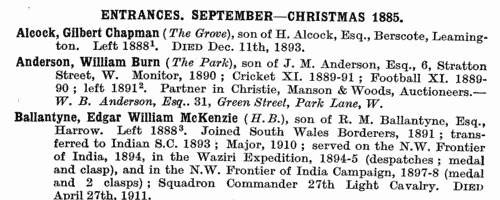
|
Research your ancestry, family history, genealogy and one-name study by direct access to original records and archives indexed by surname.
|












